|
|
|
Sort Order |
|
|
|
Items / Page
|
|
|
|
|
|
|
| Srl | Item |
| 1 |
ID:
072542
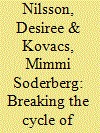

|
|
|
|
|
| Publication |
2005.
|
| Summary/Abstract |
This article analyses the prospects for sustainable peace in Liberia. The implementation of the 2003 peace agreement has largely been successful, but there are reasons for concern. Liberia's history of repeated cycles of violence and fragile peace provides valuable lessons for the current peace process. The article argues that Liberia's future is contingent on three critical aspects. First, the management of the immediate and long-term security challenges in terms of the reconstruction of the security forces, the reintegration of ex-combatants and the management of spoilers. Second, the capacity and willingness of the new government to promote democratic progress and good governance. Third, the political developments in the neighbouring region.
|
|
|
|
|
|
|
|
|
|
|
|
|
|
|
|
| 2 |
ID:
119280
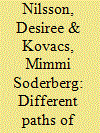

|
|
|
|
|
| Publication |
2013.
|
| Summary/Abstract |
Security Sector Reform (SSR) has developed into a key component of international peacebuilding agendas. However, there is a lack of sufficient knowledge of the advantages and drawbacks of different reform processes. This study offers a comparative analysis of two post-war states with diverse approaches to the reconstruction of the national armed forces after a civil war: Sierra Leone after the 1999 Lomé Peace Accord, where the competing warring parties were integrated into a single force; and Liberia following the 2003 Accra Peace Agreement, where the old army was disbanded and a new force was recruited and built from scratch. The findings show that each approach was associated with distinct benefits and risks during the implementation process. However, the outcomes are also similar in many important respects, and raise questions about the long-term sustainability of these reforms.
|
|
|
|
|
|
|
|
|
|
|
|
|
|
|
|
| 3 |
ID:
075105
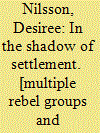

|
|
|
|
|
| Publication |
Uppsala, Department of Peace and Conflict Rsearch, 2006.
|
| Description |
viii, 145p.
|
| Series |
Report no. 73
|
| Standard Number |
9150618881
|
|
|
|
|
|
|
|
|
|
|
|
Copies: C:1/I:0,R:0,Q:0
Circulation
| Accession# | Call# | Current Location | Status | Policy | Location |
| 051952 | 355.0218/NIL 051952 | Main | On Shelf | General | |
|
|
|
|
| 4 |
ID:
113948
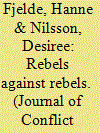

|
|
|
|
|
| Publication |
2012.
|
| Summary/Abstract |
Rebel groups that confront the government frequently become engaged in fierce and violent struggles with other groups. Why does a rebel group who is already fighting with the government become engaged in yet another struggle, thereby sacrificing scarce resources in the fight against other rebel groups? This article addresses this puzzle by providing the first global study on the determinants of interrebel violence. The authors argue that this violence should be understood as a means to secure material resources and political leverage that can help the group prevail in the conflict with the government. The quantitative analysis builds on new data on armed conflict between nonstate actors, 1989-2007. The results show that interrebel conflict is more likely when the rebel group fights in an area with drug cultivation, when the group is in control of territory beyond government reach, when the group is either militarily strong or weak in relation to other rebels, and where state authority is weak.
|
|
|
|
|
|
|
|
|
|
|
|
|
|
|
|
| 5 |
ID:
110268
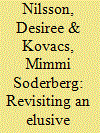

|
|
|
|
|
| Publication |
2011.
|
| Summary/Abstract |
In a seminal article, Stedman (International Security, 22, 1997, 5) suggested that the greatest source of risk to civil war peace processes comes from so-called spoilers, leaders, and groups that perceive peace as threatening and use violence to undermine attempts to achieve it. The spoiler concept has since gained significant ground and widespread legitimacy both in the academic literature and in critical policy circles. In the footsteps of this development, however, we suggest that the spoiler concept has been stretched beyond its original meaning and given raise to a number of ambiguities concerning its definition and empirical applicability. This lack of clarity in regard to some of the key aspects of the spoiler concept does not only risk undermining the usefulness of the concept itself, but also risks hampering the accumulation of valuable research on this pertinent topic. This article presents a reflection on a burgeoning research field and aims to contribute to the same by attempting to offer greater conceptual clarity in regard to a number of issues that are the core of the spoiler debate and by presenting a conceptual framework for analyzing spoilers in future research.
|
|
|
|
|
|
|
|
|
|
|
|
|
|
|
|
|
|
|
|
|